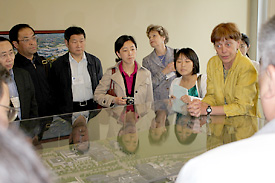U-M officials have completed two weeks of high-level exchanges with 33 counterparts from top Chinese universities.

Joan Keiser, right, managing director of the North Campus Research Complex, talks to Chinese officials who recently toured the facility. Photo by Joe Serwach.
More than 130 years after U-M President James Angell visited China to forge two major treaties between the two nations, President Mary Sue Coleman, Provost Teresa Sullivan and U-M administrators hosted Chinese education officials from 27 universities May 15-29.
The meetings offered a rare opportunity to lay the groundwork for future partnerships. While U-M and Michigan State University (which also was visited during the trip) regularly work to accelerate research and technology transfer efforts, China has a concerted plan to expand higher education to energize its economy, more than quadrupling the number of college graduates during the past decade.
The Chinese officials shared valuable insights based on this unprecedented reformation of higher education occurring in China. The number of college students earning degrees leapt from about 1 million in 1999 to an estimated 6.3 million this year while overall enrollments grew from 12.3 million in 2000 to 23 million in 2005. At the same time, the number of Chinese citizens enrolling in U.S. universities continues to grow, rising 21 percent between 2007-08 and 2008-09 to 98,235 students.
Last fall, U-M had 1,168 students from China, more than from any other nation outside the United States, while MSU enrolled 1,940 students from China.
Jianguo Hou, president of the University of Science and Technology of China, described to a campuswide, standing-room-only audience in the Michigan Union how China plans to increase education spending from 3.48 percent of its gross domestic product (the current Chinese GDP is about $5 trillion) to 4 percent of GDP over the next two years.
A National Bureau of Economic Research Report found China is the fourth-largest producer of scientific output as measured by a world total of peer-reviewed scientific articles, trailing the United States, European Union and Japan. While the United States produced 32.8 percent of those articles compared to 6 percent for China, China’s output doubled in less than 10 years while the other top three declined.
During the Michigan-China Leadership Forum, U-M officials discussed ways they can work together to advance trade, innovation and economic growth and other exchanges for faculty and students.
The 33 members of the Chinese delegation, including university presidents, university council chairs, and officials of the Ministry of Education and National Academy of Education Administration, visited U-M’s Ann Arbor and Dearborn campuses, and spent a day at MSU and the state Capitol.
“The forum has built bridges that will help our state benefit from access to the vast Chinese higher education system,” says Constance Cook, associate vice provost for academic affairs who organized the 2010 exchange and similar forums in 2008 and 2006. “These exchanges help us build our connections with the fastest growing economy in the world.”
The Chinese delegation included:
• Xuhong Zhou, president, Lanzhou University.
• Guangxian Li, executive vice president, Sichuan University.
• Lanchun Zhang, executive vice president, National Academy of Education Administration, Ministry of Education.
• Jingyu Liu, deputy director, Division for University Leaders Development, Department of National Universities, Ministry of Education.
• Chenguang Bai, vice president, Chongqing University.
• Chunyang Chen, president, Southwest Jiaotong University.
• Yibing Chen, vice president, Renmin University of China.
• Wei Deng, vice chairperson of University Council, Tsinghua University.
• Binxing Fang, president, Beijing University of Posts and Telecommunications.
• Wenbing Gao, chair of University Council, Central South University.
• Jianguo Hou, president, University of Science and Technology of China.
• Zhen Huang, vice president, Shanghai Jiaotong University.
• Dexue Jiang, vice president and vice chair of University Council, Dalian University of Technology.
• Weidong Luo, vice president, Zhejiang University.
• Jian Ma, president, Chang’an University.
• Jinming Ma, vice chair of University Council, Tongji University.
• Wei Tang, vice chair of University Council, Beijing Normal University.
• Jiadong Tong, vice president, Nankai University.
• Baoping Wang, vice president, Southeast University.
• Guangqian Wang, president, Central University of Finance and Economics.
• Yuejin Wang, vice president, Northwest A&F University.
• Zhiqiang Wang, chairperson of University Council, University of Electronic Science and Technology of China.
• Daguang Wu, vice president, Xiamen University.
• Congwei Xu, president, Hefei University of Technology.
• Jinfu Ye, chair of University Council, Northwestern Polytechnical University.
• Xiaolin Zhang, vice president, Jilin University.
• Yueyu Zhao, vice president, Hunan University.
• Detao Zheng, chair of University Council, Sun Yat-sen University.
• Denghua Zhong, vice president, Tianjin University.
• Zhilong Chen, director general, Department of National Universities, Ministry of Education.
• Ping Li, director, Division for Distance and Continuing Education, Department of Higher Education, Ministry of Education.
• Jielin Mu, deputy director general, Department of Cultural and Educational Experts State Administration of Foreign Experts Affairs.
• Shuhong Xu, deputy director, Division for Research and Cooperation, National Academy of Education Administration, Ministry of Education.
For more on the forum, go to www.umich.edu/~crlteach/index.html.

